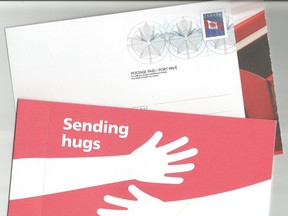There are occasions when the mailed word matters. Condolences. Thank-you letters from small children. Wedding invitations

Article content
By: Catherine Ford
They are fragile, fading — and worth their weight in gold.
Article content
Not because they are monetarily valuable, but for what they represent — the mundane days of the Second World War and the monotony of daily life punctuated by brief periods of action and fear.
They are the letters sent by my father to his parents in Calgary, mostly written in his elegant cursive penmanship, giving an on-the-ground look at the life Robert Evans Ford lived from 1939 when he was a student in Toronto through to when he was shot down over Germany in 1944 and imprisoned.
Advertisement 2
Article content
One describes his engagement to an Irish nurse; another his outrage that his parents would give permission for his younger brother to enlist. Others contain requests for warm gloves and cigarettes.
Why would any of this matter to someone else? Because one envelope, dated Nov. 27, 1941, carries Canadian postage of three cents. It is a snippy letter addressed to Mrs. C.J. Ford from the Imperial Tobacco Company informing her that “duty-free” gift parcels are sent only to members of Canadian Forces serving overseas. Grandfather promptly set the record straight by return mail that their son was, indeed, on active service in England.
This is all personal and irrelevant to anybody else, but this pile of letters, these links to the past lives of family members who are all gone, won’t exist for future generations. There will be historical texts and academic research, but the personal, the minutiae of daily life, will be missing.
Blame the computer age and the arrogance of young people who don’t realize how precious such memories are. When they tell you that computer storage will “save” their missives, just say two words: “floppy disks.”
Advertisement 3
Article content
This is the downside of convenience.
When Canada Post announced an annual loss of $748 million for the past year — a total of $3 billion lost in the past six years — one could hear the death rattle of a Canadian institution.
Unlike other so-called Crown corporations, Canada Post receives no subsidy from taxpayers. It must survive on its revenue and it must, by law, deliver mail to all Canadians five days a week. That’s about 16.7 million households.
While it’s fashionable to curse Canada Post for various reasons — mine include the astonishing amount of “junk” mail that’s dropped into our mailbox — if I had to make a choice, I’d keep Canada Post and all that recycling rather than let it go under.
How bad is it? In 2006, Canada Post delivered 5.5 billion pieces of mail; in 2023, that number was reduced to 2.2 billion.
Clearly, nothing gets delivered for three cents these days. This month, a single stamp will cost $1.15 and a roll of stamps now cost 99 cents each.
That my grandmother kept these letters isn’t surprising; it was her link to one of her sons. Many of these letters, uncovered when Kate Ford died in 1955, are nearly unreadable today as the paper is crumbling and some are written in pencil.
Advertisement 4
Article content
But I keep them because they represent a physical link to the past that will be gone forever as fewer of us physically mail letters. Still, there are occasions when the mailed word matters. Condolences. Thank-you letters from small children. Wedding invitations.
I am not absolved of taking advantage of convenience. The computer age made my Christmas card list manageable by the simple virtue of storage capacity. Before the advent of printers, every envelope had to be hand-addressed, each year. Now, all that is necessary is to fit the envelope into the printer, press a button or two and a ready-printed envelope awaits.
The post office thanks me and I thank the computer industry. Anyone who remembers being taught cursive writing will appreciate the dilemma of the kid who wrote backhand.
By the time elementary school teachers were through with me, not only could I not make those elegant loops and swirls, but my handwriting was near unreadable. Still is. Penmanship was the only subject for which I received a D.
So if the federal government wants to add a few cents — the cost of a single postage stamp — to tax all those millions of households and keep Canada Post viable, count me in.
Article content


